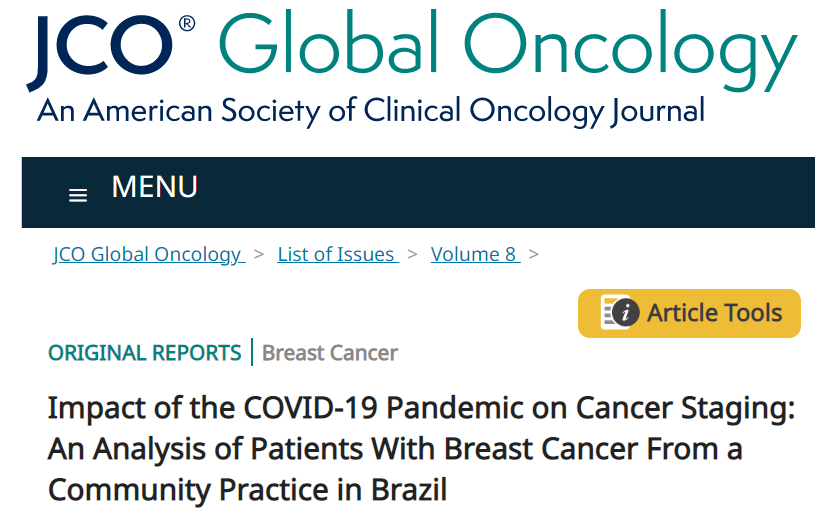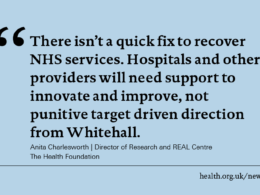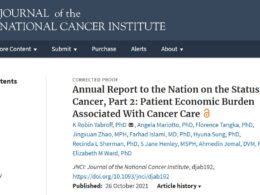Health Systems Transformation (HST)
Strategy Institute
Joaquim Cardoso MSc*
Chief Strategy Officer, Researcher and Editor
November 11, 2022
*MSc from London Business School — MIT Sloan Masters Program
Source: ASCO
EXECUTIVE SUMMARY
What is the message?
- A nationwide lockdown was enforced in Brazil starting in March 2020 because of the COVID-19 pandemic when cancer screening activities were reduced.
- The results of the study suggest that the proportion of advanced-stage BC has increased significantly since the beginning of the pandemic, …
- .. especially in tumors with a more aggressive phenotype (human epidermal growth factor receptor 2–positive and triple-negative).
- There was a lower prevalence of early-stage BC (63.6% v 68.4%) and a higher prevalence of advanced-stage BC (16.9 v 12.7%), after the onset of the pandemic (both P < .01).
- Unfortunately, a potential negative impact on treatment outcomes should be expected, which has already been reported in another study
Infographic
FIG 1. (A) Distribution of cases of early and advanced BC prepandemic and during the pandemic

ABSTRACT
PURPOSE
- A nationwide lockdown was enforced in Brazil starting in March 2020 because of the COVID-19 pandemic when cancer screening activities were reduced.
- In this study, we evaluated the impact of the COVID-19 pandemic on breast cancer (BC) diagnosis.
METHODS
- We extracted data from the medical records of patients age older than 18 years who were diagnosed with BC and started treatment or follow-up in private oncology institutions in Brazil between 2018 and 2021.
- The primary objective was to compare the stage distribution during the COVID-19 pandemic (2020–2021) with a historical prepandemic control cohort (2018–2019).
- Early BC was defined as stage I-II and advanced disease as stage IV.
RESULTS
- We collected data for 11,753 patients with an initial diagnosis of BC, with 6,493 patients in the pandemic (2020–2021) and 5,260 patients in the prepandemic period (2018–2019).
We observed a lower prevalence of early-stage BC (63.6% v 68.4%) and a higher prevalence of advanced-stage BC (16.9 v 12.7%), after the onset of the pandemic (both P < .01).
- This pattern was similar for both estrogen receptor–positive/human epidermal growth factor receptor 2–negative and human epidermal growth factor receptor 2–positive tumors:
- significantly decreased in the early stage from 69% to 67% and 68% to 58%, respectively, and
- a considerable increase in advanced-stage disease from 13% to 15% and 13% to 20%, respectively.
- For triple-negative BC, there was a significantly higher percentage of patients with advanced-stage disease during the pandemic (17% v 11%).
- Overall, age 50 years or older and postmenopausal status were associated with a greater risk of advanced stage at diagnosis during the pandemic period.
CONCLUSION
- We observed a substantial increase in the number of cases of advanced-stage BC in Brazil during the COVID-19 pandemic.
In Breast Cancer, a condition that tends to have a long natural course, the full impact of the pandemic, may take years to be understood. However, as shown in our study, the early consequences were evident.
Notably, the impact may be even greater in developing nations, who, even before the pandemic, had been slow in reducing late-stage diagnoses and had not yet experienced meaningful reductions in BC mortality.
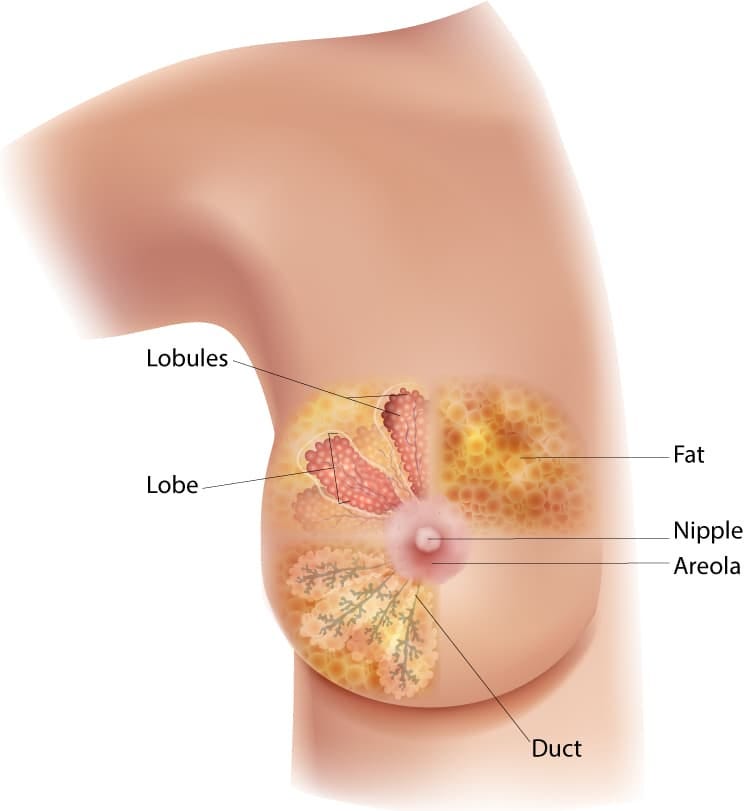
Context
Key Objective
- Our study evaluated the impact of the COVID-19 pandemic on breast cancer (BC) diagnosis.
Knowledge Generated
- The results of this study suggest that the proportion of advanced-stage BC has increased significantly since the beginning of the pandemic, …
- .. especially in tumors with a more aggressive phenotype (human epidermal growth factor receptor 2–positive and triple-negative).
- As we expected, this increase was accompanied by an equally significant decrease in early-stage BC diagnoses.
Relevance
- To our knowledge, our study is the largest reported to date addressing the impact of the COVID-19 pandemic on BC diagnosis.
- It was the first conducted in a low-middle income country and specifically addressed BC, a condition whose outcomes may be more sensitive to decreased screening and early diagnosis than other cancers because of its highly curable nature when diagnosed at an early stage.
ORIGINAL PUBLICATION (excerpt version)
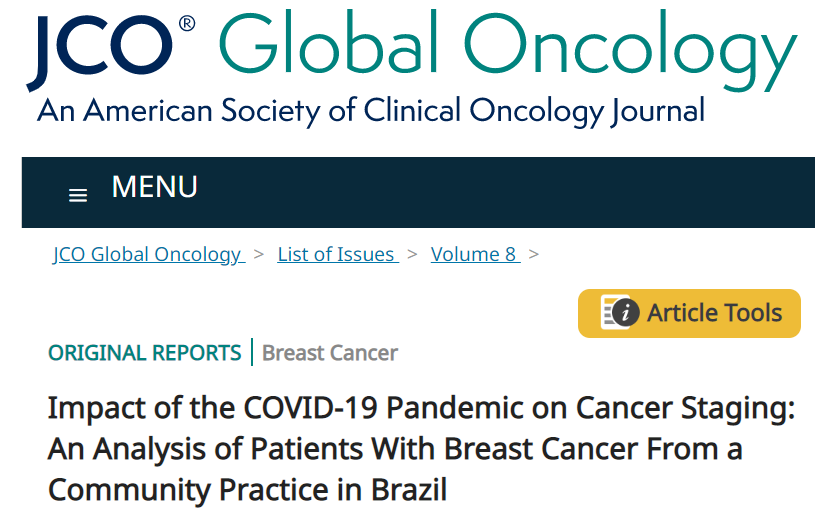
Impact of the COVID-19 Pandemic on Cancer Staging: An Analysis of Patients With Breast Cancer From a Community Practice in Brazil
JCO Global Oncology (ASCO)
Cristiano A.A. Resende, MD1 ; Helo´ısa M. Fernandes Cruz, BSN2 ; Matheus Costa e Silva, BSc2 ; Rafael D. Paes, B Pharm2 ; Rodrigo Dienstmann, MD2 ; Carlos H.E. Barrios, MD3,4,5; Aline C. Goncalves, MD6 ; Fanny G.A. Cascelli, MD2 ; Andreza K.B.A. Souto, MD1 ; Leandro C. Oliveira, MD2 ; Tomas Reinert, MD ´ 3 ; Diocesio A.P. Andrade, MD7 ; Mauro P. Passos, MD1 ; Eduardo C. Millen, MD6 ; Felipe Zerwes, MD3 ; Paulo L. Moraes, MD8 ; Bruno L. Ferrari, MD9 ; and Max S. Mano, MD2
October 10, 2022
INTRODUCTION
The first case of the novel coronavirus, also called SARCoV-2, was identified in Wuhan, China, on December 31, 2019.
Since then, cases of coronavirus disease 2019, known as COVID-19, began to spread globally. In March 2020, the WHO classified the outbreak of the disease as a pandemic, the month in which the first case was identified in São Paulo, Brazil.1
According to data updated in March 2022 by the WHO, nearly 482 million confirmed cases of COVID-19 have been reported worldwide, with approximately 6.2 million deaths since the beginning of the pandemic.2
According to official estimates provided by the federal government, as of March 2022, almost 30 million cases and 659,000 accumulated deaths have been recorded in Brazil.3
It is widely known that for patients with cancer, timely diagnosis and prompt initiation of treatment are vital to ensure the best results.
However, to flatten the curve of the COVID-19 pandemic and consequently reduce the risk of the collapse of the health system, a series of measures were instituted, including lockdowns.
These measures, however, led to a reduction or cessation of most elective health services, which, in addition to the widespread reluctance of the population to maintain their routine medical evaluations, resulted in a significant drop in cancer screening and even in the investigation of new clinical abnormalities.
This grim reality immediately raised concerns about the potential reversal of decades of progress in breast cancer (BC) early diagnosis, which largely accounts for the significant drop in mortality observed in many countries.4
In this study, we aimed to evaluate the impact of the COVID-19 pandemic on the stage of BC diagnosis in patients from the Oncoclínicas Group, the largest community oncology practice in Brazil.
We assessed the stage at BC diagnosis in patients who had their first consultation or started follow-up in the years 2020–2021 when compared with a historical control from 2018 to 2019.
METHODS, and other sections
See the original publication (this is an excerpt version only)

DISCUSSION
The COVID-19 pandemic has had a negative impact on global access to health care and has not spared oncology.
The results of this retrospective database study suggest that the proportion of advanced-stage BC at Oncoclínicas has increased significantly since the beginning of the pandemic, mainly in tumors with a more aggressive phenotype such as HER2+ and triple-negative; unsurprisingly, this increase was accompanied by an equally meaningful decrease in the diagnosis of BC at an early stage.
To the best of our knowledge, this study is the largest reported so far addressing this important issue and the first to be conducted in a low-middle income country.
Furthermore, it specifically addresses BC, a condition whose outcomes may be more sensitive to decreases in screening and early diagnosis than in other types of cancer because of its highly curable nature when diagnosed at earlier stages.
Our results are consistent with those of other studies.
Zhou et al6 reported a cohort of patients diagnosed with some types of cancer at the UC San Diego Health Cancer Services outpatient clinic.
In this series, among 442 patients with BC, there was a percentage decrease in the number of patients presenting with clinical stage I from 51.3% in 2020 to 63.9% in 2019, as well as a higher prevalence of metastatic cases (6.2% v 1.9%).
In an interesting presentation at ASCO 2021, Lloyd et al7 reported the results of a retrospective analysis of 1,930 patients diagnosed with invasive BC between 2016 and 2020 using the Beth Israel Deaconess Medical Center Cancer Registry.
The proportion of patients diagnosed with stage III and IV BC in 2020 was almost double that observed between 2016 and 2019 (12.6% v 6.6%; P < .001).
In addition to the year of diagnosis, lower income and increased Charlson Comorbidity Index were associated with a more advanced stage at diagnosis in a multivariate analysis.
Although in our study we did not address medical comorbidities, the identification of age older than 50 years and postmenopausal status as factors associated with a greater odds of metastatic disease at presentation appears in line with the results of Lloyd et al7, since this is the most vulnerable population, generally associated with other unfavorable health conditions, which was more reclusive during the lockdown and its aftermath.
The main reason for this increase in the number of advanced cases might be directly related to the reduction in the execution of screening tests such as mammography, to a greater difficulty in accessing health services as a result of lockdowns and/or to the reluctance of the population to break isolation because of the risk of infection.
According to a retrospective analysis that used Optum’s deidentified Clinformatics Data Mart Database (which includes Medicare and commercially insured members), the percentage of patients who were screened for BC decreased by 49.5% between March and June of 2020 compared with the same period in 2019.8
Yabroff et al9 also observed a significant decline in the number of cancer pathology reports, including BC, during 2020 in a population-based cancer registry pathology of patients from Georgia and Louisiana (USA), which was 40% lower in some months than in the same period in 2019.
Our study was carried out in a population served exclusively by private health services, but because of the peculiarities of public health services in low- and middle-income countries such as Brazil, we believe that the impact of the COVID-19 pandemic could be even more impactful.
Epidemiological cancer data in Brazil are still inconsistent owing to the low capillarity of cancer registry services in all states of the country.
The National Cancer Institute (INCA) publishes a document every three years that estimates, through a mathematical model, the incidence and mortality from cancer in different states of Brazil.10
Consequently, the production of data regarding the impact of the COVID-19 pandemic on the diagnosis and treatment of BC in Brazil is greatly impaired.
Two studies published in 2022 evaluated the impact of COVID-19 on the early diagnosis of BC by public health services in our country.
Moterani Júnior et al studied three Brazilian public databases regarding the performance of mammography between the beginning of 2017 and end of 2020.
There was a drop in the monthly average of mammograms from 14.9/1,000 in 2019 to 9.25/1,000 in 2020,11 raising the possibility of later diagnoses in subsequent years of screening, as demonstrated in this study.
A second study carried out at the public oncology service in the state of São Paulo compared BC diagnoses made in 2019 with those made in 2020.
The number of diagnoses performed in 2020 (pandemic period) was 59 compared with 115 in the previous year. However, the percentage of symptomatic cases (palpable masses) was 79.7% in 2020 and 50.4% in 2019 (P < .001), confirming the delay in the diagnosis of BC caused by the COVID-19 pandemic.12
Our study has some limitations, two of which are important to highlight.
First, this was a retrospective and observational study; therefore, causality could not be assessed.
Second, our analysis included patients diagnosed with BC who were evaluated during the first consultation at Oncoclínicas between 2018 and 2021.
Thus, this selection criterion included patients who sought a second opinion, potentially because of relapsed/recurrent disease, with a prior diagnosis of early-stage disease in another clinic.
However, we believe that this ascertainment bias is equally distributed across the years.
In summary
In summary, we observed a substantial increase in cases of advanced-stage BC at Oncoclínicas sites, most likely related to delays in BC diagnosis because of the COVID-19 pandemic.
The impact appeared to be greater in tumors with a more aggressive phenotype (HER2+ and triple-negative) and in older adults, potentially because of stricter confinement in this subpopulation.
Unfortunately, a potential negative impact on treatment outcomes should be expected, which has already been reported in another study.4
The COVID-19 pandemic was the first sanitary emergency to emerge in a globalized world.
The response was swift in most countries, but a price would be paid for the (probably unavoidable) neglect of other health conditions.
In BC, a condition that tends to have a long natural course, the full impact of the pandemic, may take years to be understood.
However, as shown in our study, the early consequences were evident.
Notably, the impact may be even greater in developing nations, who, even before the pandemic, had been slow in reducing late-stage diagnoses and had not yet experienced meaningful reductions in BC mortality.
In Breast Cancer, a condition that tends to have a long natural course, the full impact of the pandemic, may take years to be understood. However, as shown in our study, the early consequences were evident.
Notably, the impact may be even greater in developing nations, who, even before the pandemic, had been slow in reducing late-stage diagnoses and had not yet experienced meaningful reductions in BC mortality.
© 2022 by American Society of Clinical Oncology
PRIOR PRESENTATION
Presented as a poster at the 2022 ASCO Annual Meeting (abstr 10559), June 6, 2022, Chicago, IL.
References
See original publication (this is an excerpt version only)
Originally published at https://ascopubs.org.
About the authors & affiliations
Cristiano A.A. Resende, , MD1;
Heloísa M. Fernandes Cruz, BSN2;
Matheus Costa e Silva , BSc2;
Rafael D. Paes, B Pharm2;
Rodrigo Dienstmann, , MD2;
Carlos H.E. Barrios, , MD3,4,5;
Aline C. Goncalves, MD6;
Fanny G.A. Cascelli, MD2;
Andreza K.B.A. Souto, MD1;
Leandro C. Oliveira , MD2;
Tomás Reinert , MD3;
Diocesio A.P. Andrade , MD7;
Mauro P. Passos , MD1;
Eduardo C. Millen , MD6; Felipe Zerwes, MD3;
Paulo L. Moraes, MD8;
Bruno L. Ferrari, MD9; and
Max S. Mano

1, MD21Oncoclínicas Brasília, Brasília, Brazil
2 Oncoclínicas São Paulo, São Paulo, Brazil
3 Oncoclínicas Porto Alegre, Porto Alegre, Brazil
4 Centro de Pesquisa em Oncologia, Hospital São Lucas, PUCRS, Porto Alegre, Brazil
5 Latin American Cooperative Oncology Group (LACOG), Porto Alegre, Brazil
6 Oncoclínicas Rio de Janeiro, Rio de Janeiro, Brazil
7 Oncoclínicas Ribeirão Preto, Ribeirão Preto, Brazil
8 Centro Oncológico Antonio Ermírio de Moares, São Paulo, Brazil
9 Oncoclínicas Belo Horizonte, Belo Horizonte, Brazil




